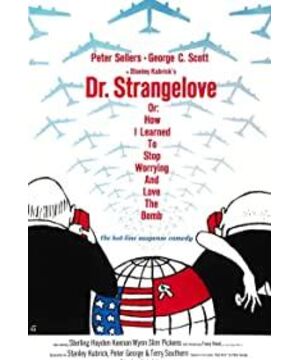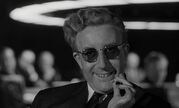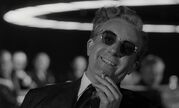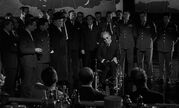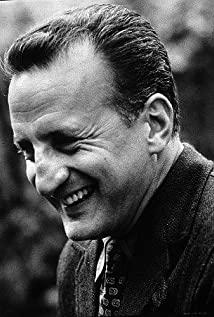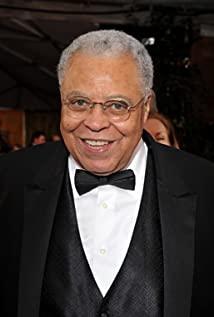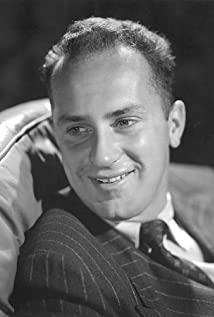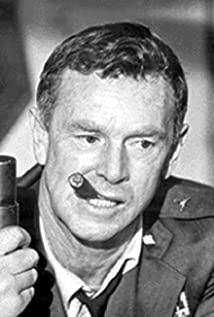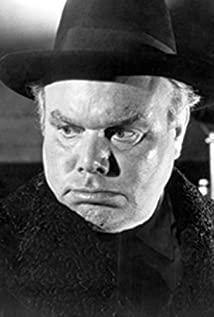The first time I heard about the movie "Dr. Strangelove", I vaguely remembered seeing it in the book of a Slovenian rhinitis patient. I don't really remember how he analyzed Kubrick's work, but I only had an impression. , remember the name "Dr. Strangelove". It was recommended by a friend during the holiday, I was fortunate to appreciate this work, and I was deeply touched, so I dared to write this film review.
The opening of the film is an introduction, a thick and vague voice introduces the ultimate "guarantee" of the film, the ultimate "guarantee" to destroy the world - "Doomsday Machine". There are no close-ups, no shots, or even shots of any Soviet personnel except the ambassador. The paradoxical core of this entire work is actually absent from the entire film, but this is also the embodiment of its absolute "presence". It manifests its own absolute existence with an absolute absence. This is the most basic phantasmagoric structure, just as many people who have no actual contact with psychopaths are inexplicably terrified of this group, the imagery of nuclear warheads, psychopaths, criminals, fundamentalists, terrorists, etc. is our The shadows of a safe life, but it is because of these shadowy constitutive exceptions that we can organize a "peaceful", "orderly", "civilized" society and be content with life and obey the ideological machine to us command. Kubrick is clearly aware of this, so this shadowy presence sets up the entire movie, serving as the ultimate backdrop for everything from the takeoff of the cowboy bomber to the drop of the cowboy nuke. It doesn't even have to be real, all we need is a name, an empty, repulsive name, and even if such a machine doesn't exist, its existence is already guaranteed by the belief that "we believe there is" . The detonation of countless nuclear warheads at the end also vaguely reveals that it is not the machine that destroys the world in the end, but the nuclear war itself initiated by humans. In modern times, the "nuclear warhead" we fear is not necessarily so material. For society, what is more realistic is our belief that "it can destroy the world", this basic ideological operation. A "doomsday machine" is the panic in which everything in our lives is accepted unconditionally.
In this film, the humor-supremacist general's obsession with bodily fluids and his phobia-like fear of Soviet hair can be studied in a traditional Freudian psychoanalysis: the general experienced sexual failure, sexual dissatisfaction This trauma, and therefore in order to cover it up for self-preservation in the form of phobic symptoms, projected libido onto the Soviets, and the humoral theory was nothing but an obsession to generate this transference. Of course, we can go a step further, go deeper and see what Kubrick has to say. This may not only be the end of the world triggered by personal symptoms, but an "event" that occurs when the world's self-contradiction intensifies to its peak, an event that condemns oneself to death, but it just broke out in the form of a phobia. In the film, the Soviet ambassador said that the reason for making the doomsday machine is a low-cost threat device produced because it cannot afford the burden of "war of arms", "war of technology" and "war of peace", that is, when ideological confrontation, When the technological and military-industrial confrontation develops to its limit, the only way out is destruction. The rapid development of the Soviet Union and the United States was clearly based on this ideological antagonism. The Soviets hated "Americans", and Americans hated "Soviet people", but the object of hatred was obviously distorted and exaggerated, and was squinted (as mentioned above), this instilled assumption It has become the main constituent foundation of the ideological machines of both sides, and every member of the country is more or less psychopathological. In other words, every citizen is already a body fluid supremacy, but the methods and theories of hatred are different.
Therefore, we can obviously draw the conclusion that under the background at that time, the United States and the Soviet Union were inseparable from each other. This is enough to see in the harmonious dialogue between the President of the United States and the President of the Soviet Union. The words expressed absolute friendliness. Of course, Kubrick has made some subtleties here: the President of the United States seems to be talking calmly to a vexatious child in the same way a father persuades a child, and the President of the Soviet Union has been made a vulgar joke before he even appears. main character. On the surface, this seems to be a mockery of the Soviet Union for the sake of pleasing the American audience, but if you look further, it is not a kind of irony. The US president upholds the principle of "peace first" and "never attack first" Facing the panic-stricken chairman of the Soviet Union, he said "Hello, I'm fine", but could do nothing about this most absurd end of the apocalypse. This is the absolute failure of the "compassion and rationality" of the United States as a world hegemon. The collapse of the idol formed by the "contempt of the pack" and the proud "freedom and equality". The image of the President of the United States is not the image of an almighty father. On the contrary, he is an incompetent father, a useless father who can only pretend mockery.
As the title of the whole article, "Dr. Strangelove" is a more puzzling character. He has a mechanical hand that automatically performs the Nazi salute from time to time, a typical Freudian fetish: calling the president Mein Fuhrer, and the most classic racist, elitist thinking, it seems that no matter what, we will definitely match him with the most German one. Notorious political parties linked together. He is the ghost of the name everyone fears, yet mixed in at the highest decision-making levels in the United States, proclaiming the ubiquitous and pervasive horror of the Nazis. Is he just a grim image used to evoke the horrors of the Nazis? My opinion is that he is a symbol, an image that fills the absence of absolute terror with the Nazis (as is often the case in Cthulhu mythology: "indescribable terror"). Not only was he a Nazi, he emerged as the closest thing to absolute terror, akin to an alien. I think this is also the "reason" for his title, "Dr. Strangelove" can obviously be seen as a one-step anti-Nazi film, but it is also clearly not only an anti-Nazi film, "nuclear fear", "right" "The fear of sexually induced psychosis", "the horror of ideological disputes", these are the elements of the whole film, and it is Dr. Strangelove who can unify them. He is a metaphor for the absolute horror after the end of World War II, and all the remaining elements are but components of this absolute terror, or rather, he is the "stitching point" of all elements, proclaiming to all audiences: "In the Worse, I can make it worse." And his presence is absolutely absurd (how could a Nazi so obvious get into the Pentagon?), as Lacan puts it , the absolute absurdity of the signifier suture point. We know its absurdity but do not reflect on and question it. We are just fearful and hysterical, succumbing to the shadow of the Nazis that has passed but never dissipated, and then completely manipulated and captured by ideology.
"Dr. Strangelove" can be regarded as a classic ideological criticism film, and Kubrick mixed so many ideologies in this film: Nazis, socialist horror, cowboy spirit, neurotic representation Psychoanalysis, sexual pleasure, etc. are also sufficient as evidence. And the weird scientist in the wheelchair was Kubrick's warning: "Reflect, reflect, reflect," even more so in those times of tension. Of course, in our age of ideological growth, the situation is obviously not as optimistic as it was then.
View more about Dr. Strangelove or: How I Learned to Stop Worrying and Love the Bomb reviews


